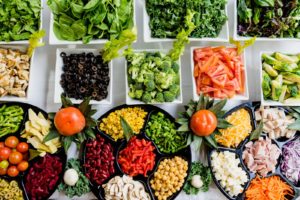
Nutrition is part of the foundation for good health and overall well-being. Eating healthy, staying active, and enjoying life are the best ways to stay healthy and happy, no matter your age. Staying healthy can also affect insurance rates and coverage.
It may be more challenging to find affordable life insurance for seniors as compared to someone younger, but it is possible. Older adults who are more healthy will have an easier time finding life insurance coverage, which is why it is important to take charge of your own health.
Healthy eating is one of the best things everyone can do to stay energized and to lower the risk for many chronic conditions. Eating a varied diet with plenty of vitamins, minerals, fiber, and other nutrients can help seniors stay healthy as they age.
Important Nutrients for Older Adults
There are vitamins, minerals, and other nutrients that are especially important for seniors. Some are needed for body functions and structures, while some help lower the risk for chronic health conditions.
Calcium
Calcium is an important mineral for healthy bones, joints, and muscles. Calcium is abundant in dairy foods like milk, yogurt, and cheese. It is also found in plant-based milk, some soy products, fortified orange juice, some green vegetables, and some cereals.
Women over 50 and men over 70 need 1,200 mg of calcium daily, which can be met with three servings of dairy foods. A supplement may be needed to meet daily needs, especially if you are not consuming dairy foods.
Vitamin D
Vitamin D helps the body absorb calcium and regulate calcium levels in the body. It also plays a role in immunity and preventing some diseases. Vitamin D is found in fatty fish, many dairy products, plant-based milk, and some cereals, but it is not found in large quantities in the diet.
The best source of vitamin D comes from sunlight. A vitamin D supplement may be needed in the winter months or for those who do not get much sunlight year-round.
Vitamin B12
Vitamin B12 is found in animal products like meat, poultry, fish, and eggs. This vitamin is necessary for the nervous system, DNA function, enzyme reactions, and other important substances in the body.
Adults over the age of 50 do not absorb vitamin B12 from natural sources very well, so it may be necessary to take a supplement. Older adults can also eat foods that have been fortified with vitamin B12 like cereal or soy milk because that form of vitamin B12 is absorbed more effectively.
Protein
The function of protein is to support the body as well as build and repair body tissue like muscles. Protein is found in a wide variety of foods like meat, poultry, fish, eggs, beans, nuts, seeds, soy products, milk, yogurt, cheese, and some grains.
Older adults experience a loss of muscle tissue as they get older, which is called sarcopenia. Because of this, you need to eat plenty of protein to help retain muscle tissue. Eating protein with every meal and snack is the best way for adults to make sure they have enough protein to meet their daily needs.

Fiber
Fruits, vegetables, beans, nuts, seeds, and grains are the best sources of fiber in the diet. Fiber is needed to keep our digestive system regular. This nutrient can also have a role in weight management because fiber expands in the stomach, which leads to a feeling of fullness.
For seniors, soluble fiber found in oats, fruits, and vegetables can help lower cholesterol levels. Because fiber has so many important functions, it is critical to make sure you are eating plenty of fruits, vegetables, whole grains, beans, nuts, and seeds.
Omega-3 Fatty Acids
Omega-3 fatty acids are a type of unsaturated heart-healthy fat. They are found in fatty fish like salmon, tuna, and sardines. Omega-3’s have known benefits for heart health and cognitive health. This nutrient can also decrease inflammation in the body.
The American Heart Association recommends that all adults eat two servings of four to six ounces of fish weekly. Eating plenty of fish is one thing that can help improve memory. For anyone who does not eat fish regularly, a fish oil supplement may be needed.
Antioxidants and Phytonutrients
Antioxidants help neutralize free radicals in the body, which are produced by metabolic processes, exercise, smoking, exposure to ultraviolet radiation, and pollution. Free radicals are unstable molecules that can cause oxidative damage to cells, increase inflammation, and increase the risk of chronic diseases.
Antioxidants are found in many fruits, vegetables, and grains. Vitamin C, vitamin E, beta-carotene, and selenium are some common antioxidants. Phytonutrients are nutrients found in plant foods that may act as antioxidants and give fruits and vegetables their various colors. This is why eating the rainbow is one of the keys to preventing diseases.
Eating to Prevent Diseases
Healthy eating is one of the best tools for lowering risk and preventing chronic health conditions. Age is one uncontrollable risk factor for many diseases, but a healthy and varied diet can help lower the risk for these diseases.
Heart Disease
Eating to lower the risk of heart disease includes plenty of fish, colorful fruits, colorful vegetables, whole grains, nuts, seeds, and lean protein. Plant foods have nutrients like fiber, antioxidants, phytonutrients, and omega-3 fatty acids that are vital for heart health. They are also low in sugar and sodium, which also helps keep our hearts healthy.
Cancer
A plant-based diet can also be beneficial to lower the risk of certain types of cancer. Fiber, antioxidants, phytonutrients, and plenty of vitamins and minerals can help lower the risk for some types of cancer. Cutting back on processed and red meat and limiting alcohol are other nutritional strategies that are protective against cancer.
Diabetes
Older adults are at higher risk for Type 2 diabetes. Cutting back on portion sizes, limiting added sugars, and limiting processed and packaged foods can help manage weight and lower the risk for developing Type 2 diabetes.
Fruits, vegetables, lean protein, low-fat or fat-free dairy foods, whole grains, beans, nuts, and seeds can give seniors the nutrients they need while keeping Type 2 diabetes out of the picture. For those who have diabetes, managing carbohydrate consumption throughout the day, eating plenty of fiber, and eating regular meals are all important for managing this condition.
Other Nutritional Considerations
Seniors should also make sure they are drinking plenty of fluids to stay hydrated. A multivitamin or supplements helps meet the needs where nutrients may be lacking in the diet.
Hydration
The thirst mechanism in older adults does not work as well as in younger adults, so it is vital to make sure to consume enough water even when not thirsty. The best beverages to stay hydrated and for good nutrition include water, low-fat or fat-free milk, and unsweetened coffee and tea.
Adults should limit sugary beverages like soda, sports drinks, energy drinks, and sugary coffee beverages. Dehydration can be dangerous, especially in senior adults, so consuming fluids throughout the day is critical for good health.
Supplements
Supplements are not a replacement for a healthy diet but can be used to supplement missed or lacking nutrients. All older adults should consider taking a daily multivitamin designed for seniors.
Some may also need calcium, vitamin D, or vitamin B12 supplement, depending on their diet. Fish oil is another useful supplement to get omega-3 fatty acids for seniors who do not eat fish regularly.
You should always consult with your health care professional or pharmacist before starting any new supplements. Some may interact with medications, so this is important to monitor.
Best Foods for Older Adults
The best foods for senior adults include fruits, vegetables, whole grains, lean protein, low-fat or fat-free dairy, soy-based foods, nuts, seeds, beans, and water. Eating a variety of nutritious foods daily helps keep your mind and body healthy as you age.
Melissa Morris writes for the life insurance comparison site, CompareLifeInsurance.com. She has a master of science degree in exercise science, is an ACSM certified exercise physiologist, and an ISSN certified sports nutritionist.